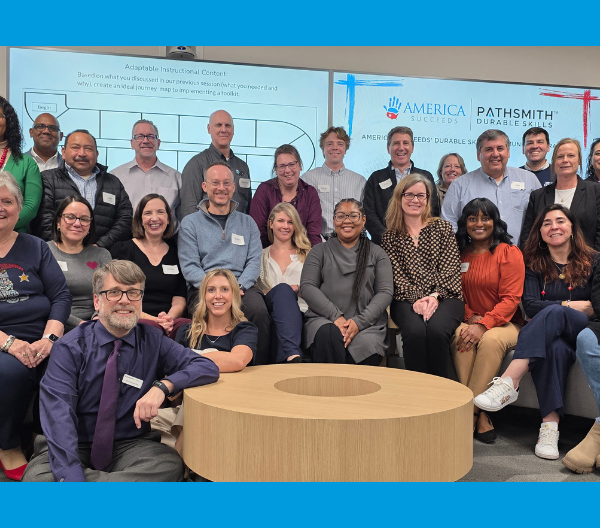“Tools and resources to do the job” – you hear that a lot in both education and business circles. In business, it applies not just to equipment, but also proper training and access to mentors and feedback. All of these can aid in improvement. Successful businesses invest heavily in training their people and preparing them for success. And great leaders know that training is part of continuous improvement. An employee’s education and preparation, no matter how good, shouldn’t end on the first day on the job.
Improving Educator Preparation
In education, preparing educators to teach and lead successfully is often overlooked as a critical lever for improving outcomes for kids. Luckily over the past few years, we’ve seen increased focus on improving educator preparation, at both the state and federal level. It’s a hugely positive, albeit overdue, development. Strengthening educator preparation presents an enormous opportunity for improving teacher quality. This goes hand-in-hand with efforts to make teacher compensation smarter, make personnel policies fairer and more student-focused, and strengthen accountability for educators. Pushing for better preparation will help teachers be more effective in their jobs. In turn, this moves us closer to ensuring every child has access to a great teacher.
And there is a lot of room for improvement. For years, the National Council on Teacher Quality (NCTQ) has been a leader in the effort to improve teacher preparation. This past December, NCTQ released another round of ratings for educator preparation programs across the country. In short, only some schools of education are taking promising steps to up their game. For the overwhelming majority of educators-to-be, training is going to fall woefully short of what they need to help their students succeed. You can read a more detailed overview of the NCTQ ratings from Brookings, including discussion about the challenges of raising expectations and ensuring diversity among teaching candidates, here.
Challenges to Address
For business leaders, it’s common sense that training for a profession should reflect what a worker actually needs to know and be able to do on the job. So what’s lacking about educator preparation? Here are just a few of the problems with teacher preparation programs:
- Program entry requirements are not competitive, and a huge number of our college students do not even consider teaching as an attractive career option.
- Program curricula are not rigorous, often not evidence-based, and not designed to prepare teachers for the challenges of a classroom environment.
- Teachers receive little real experience in the classroom before becoming full-time teachers. There are rarely requirements for teachers to demonstrate instructional competency as a condition of obtaining a license.
- Preparation programs are not held accountable for whether their graduates can actually teach effectively. Program accreditation and renewal are not based on results, and little public data exists on performance. Consequently, both teachers and districts are hostage to the existing pipeline without actionable information to choose from varied programs.
- Many view training and preparation as a one-time exercise. It is not aligned with continuous professional development. Beginning teachers lack strong mentoring and induction, as well as meaningful ongoing development and opportunities to learn and collaborate as they advance.
- Similarly, there are limits to career pathways. As they progress in their careers, teachers have few options to develop new skills, gain leadership experience, or tackle new challenges without leaving the classroom altogether.
The lack of a rigorous, coherent training and development pipeline hampers school leadership as well. Too many teachers struggle to overcome their inadequate training for the classroom. Likewise, ill-equipped school principals are not ready and able to attract, develop, and retain instructional talent. Nor are they capable of creating a culture of educational excellence that is embraced by both teachers and students. School leaders play a huge role in facilitating development and collaboration among the instructional team and supporting school improvement efforts. But leadership preparation programs are woefully behind in providing the high-quality training this task demands.
Working Toward Solutions
Despite these challenges, we believe there is reason for optimism. Great organizations like Deans For Impact are leading the way by providing a space in which progressive leaders of schools of education can figure out together how to transform their preparation programs from the inside.
And as with other areas of education, state policy matters a great deal. Fortunately there are lots of ideas out there for improving state policies governing teacher preparation. There’s even a great policy toolkit for strengthening principal preparation as well. From the vantage point of America Succeeds, we believe three critical policy levers show particular promise:
- Require meaningful clinical experiences and demonstrated classroom competency as a condition of licensure.
- Collect and publish performance data on preparation programs so that the consumers – districts, schools, and teachers – have the information they need to select the best programs and hold preparation programs accountable for results.
- Ensure training and development is an ongoing, career-long process.
Some states are making exciting progress. Delaware and Rhode Island have led the way in adopting rigorous standards for admission. States like North Carolina, Ohio, and Tennessee joined them in making improvements to collect and use data to evaluate program outcomes, including whether graduates obtain teaching jobs and the impact graduates have on student achievement.
There’s more work to do. We can only pull and activate these policy levers through strong and effective advocacy, policy adoption, and careful implementation.
As we explore these over the year ahead, we invite business leaders to join us in championing common sense solutions that position our educators for success.




